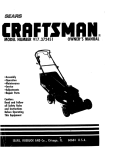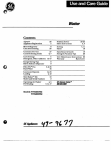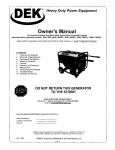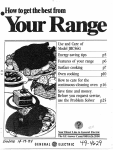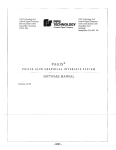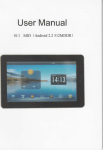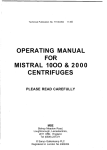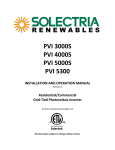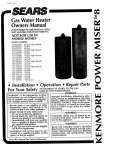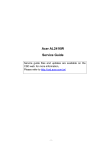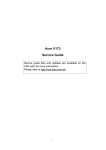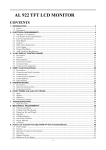Download Universal Boiler Works BF100W4 Specifications
Transcript
Operating and Maintenance Manual U-I5647 Pf~er BF100W4 Water; ASME Section 4 Ship Date: 1/24/2000 - UNIVERSAL BOILER WORKS, INC. 1207 S.E. SECOND STREET GALVA, IL 61434 T: (309)932-3088 F: (309)932-2078 [email protected] www.universalboiler.com - 1207 S.E. Second St. Galva,lllimis61434 Tel: (309) 932-3088 Fax: (309) 932-2078 www.unidtmk.~ OPERATING AND MAINTENANCE INFORMATION BOILER MODEL #: UNIVERSAL ORDER #: , ! W l E R SERIAL #: BURNER MODEL #: W.O. I INVOICE #: CHAPTER I GENERAL DESCRIPTION MODEL BF HOT WATER BOILER A. The Boiler The Universal Boiler Works, Inc, (UBW) Model BF, is a 5 pass steel wa&tube boiler of the "0" type design. It consists of the upper and lower headers with interconnecting downcomer and flexible tangent tubes, The tubes are symmetrically installed to provide uniform gas side and water side fluid flow. A11 boiler tubes are a minimum of 1.5 inches: meter, 0,095" wall through 700 horsepower kid 2 indiameter 0.105" wall for units above 700 horsepower. Each tube is fitted with a f e d at each end, which is press fitbed into each drum hole. This method of tube attachment permits easy replamment of tubes without the need for welding or d i n g . (See Figure 1-1) Multi-bend tangentially mmgd watertubes form the combustion chamber (furnace) and convection gas passes. Specific tube arrangements and the front and rear walls provide the means for gas flow direction without the use of baffles. (See Figure 1-2) In accordance with the ASME (American Society of Mechanical Engineers) Code, the boiler is designed, fabricated, tested, and inspcted following the mtes of Section W for (operating at less than 2500 F.) I Power Boil= (operation at greater 'irran 2500 F. or above 1 60 psig), and stamped accordingly. The location of the authorized "H" or "S" stamp is located on the upper header near the rear ofthe unit. As a complete package, the pressure vesse1 is mounted on a 4" high insdated base frame. This base frame includes the lifting Iugs for rigging purposes. Over 200 horsepower, the base is 6"). A series of 11 gauge steel panels, which are bolted md sealed, provide a gas tight inner casing of up to 3" W.C. Attached to this inner casing is a 2.0 inch thick fikrgiass insulation blanket rated at 2,3000 F. The outer casing is fabricated of 14 gauge corrugated aluminized steel panels, underlayed with 1P2" thick fiberglass blanket insulation. A 2 inch air space between the inner and outer jackets provides additional cooling of the outer surfaces of the boiler. (See Figure 1-3 and Figure 1 4 ) The combustion chamber floor is insulated with ceramic fiberboard rated at 2,000O F and the front and rear walls are poured refractory rated at 2,8000 F, For Section 1 Boilers, the lower drum is insulated with a 2,3000 F fiberglass blanket. Universal Boiler Works. tnc, Chptcr I General Description o f Hat Water Boiler Please refer to Figure 1-5 for a visual undcrstand~ng o f the parts and connection points that cornprlst the boiler. This will help in understanding your unit before start-up and for any questions that may arise, for which you require answers. Refer to the G e n d Arrangement drawing fur specific connections sizes and location dimensions. The General Arrangement drawing will also depict optional items that were added in accordance with the project specifications. C. Pressure Parts The BF hot watcr baiIer has two (2) dmm or headers, one uppw and onc Iowtr. The upper dnun is supported by the rear down~~mcr, front and rear walls, and steel structm. Tappings for the water temperature sensing controls arc Iocated at the front of the upper drum including the tapping for the primary low water cutoff control. At the rear of the upper dnun are the tappings for the safety relief valves. The conn&on of the bailer water supply to the system is located at the kont of the upper dnun. On the top centerline of the upper drum at the front, is the vent connection. This should be piped to the expansion tank. The lower h,sometime r e f d to as the mud drum contains the drain connection, located at the rear bottom ctnbrlhe. A drain valve should be instalIed to this connection by the installing contractor a d piped to a safe discharge point. -hD8~h& NOTE: The Model BF hot water boiler does not include tappings for fresh water make-up, Treated water make-up when needed, should be added via the expansion tank, A tight hot water system should have a minimal amount of makeup and a water meter is recommended to monitor the amount of water make-up. - The term wn~rr~ri covers the olectr icnl or electro. mechanical devices mounted on the boiler or furnished loose For field installation. The* devices work in harmony with the burner controls, discussed in the bumer operatinghaintenance manual. Turn refers to mechanical items such as valves, pressure or temperature indicating devices, and piped items responding to the boiler's pressure or temperature functions. Regardless of the component, the authorized boiler operator must b h i l i a r with all mounted and if furnishad, *mote mounted items that will affect the cpmtioa ofthe boiler. d Spceific controls fitrnishod for the project will be denoted on the General hangement drawing and on the Bill of Materids list. PI- refer to Figure 1-5 for cmfrol Iocations. 1. . . A - This device starts and stops the bmer based on the sy&m h a n d for d i t i o d heat or when the demand is satisfied, . . CQnfml 2. Wieh_Lmlt - This device, ats0 h o w n as an Excess Temperature Control, stops the burner when the normal operating temperature set-point has been exceeded. Normally the device is a mechanical manual reset type, but may be wired to affect a manual reset via the combustion flame safeguard control . - 3, k h h h u g C a For burners which oprate on the full modulation principle, this device positions the burner from low fire to high fire in response to system demand. When a L .> Universal Boiler Works, Inc, - C- full load is required, this control will signal the burner to drive to the maximum firing position and as the load is satisfied, positions the burner to less input, eventually driving the burner to low fire for safe shutdown upon -, .+. demand ~tisfhction. Smaller units, 1than 80 horsepow, wilt b standidy equippod with a control that positions the burner either at full fire or low fire and is referred to or hown as a ow Fire Canb.al. While it is design4 to respond to the system demand, it is not designed to position the bunttr at any pint in betwen high or low firt. 4. A probe sensing safe operating level. In a LmwW device below a hot water boiler, this device should be a back up to a system water sensing device, as a low W r level in a hot water boiler is very serious and will affect the longevity of tbe tubs. I- L, . b i l e r Trim I . W e r Water Pressure Gwgg Mechanical indicating device for visual indication of the internal pressure of the boiler (waterside). 2. ~ e m p e u a u r Mechanical device to indicate the relative water temperature at the outlet connection to the system, \, - 3. Brlief Valve(s\ Dependiny upon the s i x of the boiler. one or more water pressure relief valves are furnished. These valves are shipped loose and should be piped to a safe point ofdischarge by the installing contractor. The set point is genera1ly iess than the system operating pressure, to relieve water p n t i sure within the bailer when the set point has been exceeded. Under no circumstances should the setpoint be altered above the system design nor above the boiler design pressure. Vdve sizing and quantity are determined in accordance with the Code. Additional valves be added in accordance with the project specifications. -- 4. (Optional) When fumishd, this 6 vice is shipped l ~ o s efor instaktion by the contractor. This device indicates the outlet gas temperature of the boiler. It is normatly laxted in the vertid rise of the stack to the boiler connection; approximateIy three feet above the boiler connection. Provides indication o f the fireside cleanliness of the boiler. * w W-CuW(Optional) This device, when required by pject specifications, can be of the inprobe sensing type or an exkmd float actuated device. Its purpose is to shut the burner should the primary low water cutoff fail. 5, m 1 General Description o f Hot Water Boiler 5. p - - Valve (Optional) When finished, this valve is shipped loose for contractor piping ( rear drum connection) and is used to drain the boiler for waterside inspection or when the unit is to be stored, for any lengthy period. 6. J n w W a t d 2 m h i u - (Optional) When an optional float actuated control is furnished in lieu of the standard prok control, a drain valve is furnished. This valve is factory piped to the bottom of the float housing to - Universal Boil e t Works. Inc. C h a w I General Oescription of Hot Water Boiler permit periodic draining of the hwsing 3. to remove any accumulated sludge. Locared on the burncr. provides purge air of the bile< prior to ignition and following a safe shutdown. Provides the air required for E, Burner Controb combustion. The Model BF boiler is design4 Fbt operation with a forced draft b m e r for natural gas, LP gas, or light oil. A separate burner mmmt fram the specific burner manufacturer is included. In that manual are the descriptions of the various controls provided in a c c o ~with the requirmenl of the Undetwfitds IAmratory W.L) and any specific requirements of the project, in a c c o ~with the project specifications. Within the bucner manual, one will find the Burner hhmgment Combwtiun Safeguard Conml along with Sm-up instructions and combustion settings. For fuel supply connections, refer to the &nerd hangement drawing and the burner manual. 4. Folced - Located in the Control Pmel. This device al1ows current flow to the fan motor upon energization of the coil. Overloads are within the starter to prevent damage to the motor in the event of installed voltage or current spikes. 5, * . 5 - For W- latiom opcnting on a 3 phase powcr supply, this device is located in the controI panel for stepdown.voltage of 120 volt single phase supply to the b w e r and boiler controls. 6. - Located on the burner position the fuel input valve ad the i-'E d e t air damper in accordance with ,i demand requirements. . to As a brief aver-view, the package wiI1 contain: -L ' 1. Cantrol-hcatedootkebmeron smaller units or on the boiler b extension at the front of the boiler. The electrical supply for the burner and contsoIs are to tre made in this panel, interface connections to system contmls or shipped loose controls will h y - 7. Gas TTraia Standardly located on the left side of the bailer, when Each the front of ?heunit. The train for units operating on gas, as a minimum, will have a main gas pressure regulator, shutoff cocks, safety shutdown be lmted within this panel. 2. valves, and fuel input valve. Please refer to the burner manual for specific gas train components. - Located in the Control Panel to provide safe start procedure for burner start-up, burner operation, and safety shutdown. Flame supervision is via a flame scanner which monitots pilot ignition, main flame ignition, and flame strength during operation, It is programmed to shut the burner fuel supply off in the event of an unsafe condition. 8. ? - A separate pilot regulator and pilot safeg shutoff valvc are h i s h e d on the bmer for gas pilot: ignition. P NOTE: Some units operating on oil may be equipped with direct spark ignition. Refertotheburnermanualforspecifics. . -- Universal Boiler Works, Ine. 9. u Pi1 C m I Omed -ription Locatcdonthcbumer and as a minimum will include oil metering valve, oil pressure regulator. oil strainer, safety shutoff valves, and oil pressure gauges. Standard atomization of oil is via mechanical pssurization. Air atomization is optional. Pleast refer to the burner manual for spific oil components furnished. Fuel F. Other Controis Specific project requirements may have included controls not mentioned in this Ocneral Description section. These items csln include Ieadflag systems, indoor/outdoor energy management interface systems, system pump interlock, etc. For specific items furnished by UBW, refer to the Bill of Materials and the Burner Manual for additional infomation. 2* is important to unthe operation of rj., device, which will hterhcc with the boilerhumer, so that all components oprstc as they have been selected and designed. Do not attempt to by-pass any control or device during start-up or during operation in order to e x p l i t e start-up or continue operation. Each device on the package has been firmished for a specific reason of d e t y or infodonal purposes. If a component is not operatiod, coatact your I d service agency or UBW. ..=' of Hot Water Boiler Chapter 2 Unloading and Installation Model BF Hot Water Boiler A. Unloading Before any attempt to unload the boiler from the transport company is made, perform a visual inspection of the boiler. Ascertain if any damage has been incurred during transit. The equipment has been loaded by UBW and accepted by the transport company as undamaged. Once the equipment has been lifted h m the trailer, my damage that is not filed against the Transport Company, will be the responsibility of the rigger or purchaser. NOTE boiler base frame. (Please refer to figure 2- I ) These lugs have been located for the specific purpose of lifting the unit with the use of a spreader bar. A spreader is needed to prevent damage to the outside casing. Refer to figure 2-2 for the correct placement of the spreader bar and cables. Smaller units, depending upon the available equipment, may be unloaded via a forklift. If a forklift is used, ascertain its lifiing capabilities and the use of extended forks. If the boiler will mt be zm~aiiedfor m e perid of time qfter ddivery, #he mit sbuId be protected adequately again#fallen debris, the weather, etc. extended storage will be neceswty, proper @-up uf the unit s h d be provided to prevent o w n piof the tubes. Make certain thst all s h m i loose or separate& boxed componenb ar~dconirob me stored with rite Boiler or proper& marked arad located, so that whet1 the items me reyiired they can easily be reaimed Check that all items have beet1 received. Report tzry missing items. Ifems not noted us missing, within 48 kvrrrs of receipt, will twt be replaced of charge, as we will mmme thai /he shipment h beet^ received complete. The Model BF boiler is equipped with lifting lugs located on each side of the X)o not attach slings around the b o i k or to the burner in an attempt to p d or drag the unit! If the unit must be dragged or pulled, attach cables to the lifting lugs only. UBW does not recommend &aaaraaarnp the unit for awv wed Gisfmre, If the unit must be placed into a location other than lifting into place, we recommend the use of rollers. DO WOT ALLOW THE UNIT TO BE SET DOWN UNEVIENLY. IF A FRONT BASE EXTENSION HAS BEEN PROVIDED, MAKE CERTAIN THAT IT DOES NOT MAKE CONTACT M SUCH A WAY AS TO SUPPORT THE WEIGHT OF THE BOLLER THIS COULD DISTORT THE FRAME AT THAT PDLNT OF CONTACT. - t:rlrrcrs;~lIJullcr Works. Ir~c.-. L'11;bpcr 1 UntuJiny 2k l~~slallrrtwn ol' kldol 131: 1 lot Wa1c.r t3oilcr The Mode! BF boiler must be installed on a level surface. Ir i s recommended that the unit be placed on a housekeeping pad to prevent water splashing during routine floor cleaning. As a rule of thumb. we recommend that a quantity o f 10 ctin per boiler horsepower airflow be available, whcncver the burner is operating. The location of bailer room air supply dampers should provide cross flaw ventilation. The recommended size of the openings shouId be i n accordance with TabIe 2- I . Model BF boiler is adequately insulated and has an enciosed combustion chamber, do not instal1 t i e boiler on a combustible surface! Ascertain what the local code requirement dictates and as well, the project specifications, for the type of surface upon which the boiler is to rest. Make-up air openings may be fixed or may include a motorized drive for opedclose operation. Tf the openings are furnished with an electrical drive, check the burner electrical wiring diagram ibr interface connections. The burner must be started if the air dampers are closed. Tf the unit is to be installed on a trailer, When piece of equipment, make certain that the trailer floor is adequately insulated if the floor is wood. We recommend that the .floor be covered with sheet steel or some type of heat adequate service and maintenance space is provided. As a minimum, a 30-inch Although the as a portable resistant covering. Project specification will dictate the location and orientation of the boiler within the boiler room. The boiler should be located in a well-lighted area and boiler room air supply ducts should not be positioned near the rear of the boiler. Cold air hitting directly on the unit can have an adverse eff'ect on the ' unit. D.Air S u ~ ~ i v Adequate air supply into the boiier room tbr combustion must be provided. Ij'ndcr no circumsiancc should the boiler be operated when a negative pressure {~acuurn) cxists. We recommend a siiyntiy positive condition at all times. . placing the . I boiler, ensure space should be allowed at the rear of the boiler, a minimum of 30-inches at rhe front of the boiler for burner sewicing and for each side. Refer to the General Arrangement drawing far aisle space requirements; project specifications may require more room. (See Figure 2-3) NOTE: Project specifications andlor local codes may require more service clearance space than noted above. To ensure rase uf access to the t itbes, 11ot it~stnlithe unit against a wall or other su~nortingstructures. This wili prevent access panel removal. The outer and inner casings are removable to provide access lo the tubes from each sidc of thc boilur. Therc is an access cioor at the back of the boiler for access to ~ h ccombustion chambcr, Kecp this in mind when placing piping, etc. at the back ofthc unit and alony thc sidcs. gnd lcakaee of combustible products. As an option. access panels located at the rear of the unit f i r cleaning and inspecting the convection passes, may The stack outlet should be fitted with some means of preventing ingress of rain as shown in Figure 2-4. have been M s h e d . Check the general arrangement drawing if these have been furnished to ascertain if clearance at the rear will be adequate for tube surface brushing. F. Connections Local cdes and project specifications wilt dictate the requirements for all interface connections of fuel watts exhaust and eIdcal. Those requirements must be adhered to and inspected by the authority having jurisdiction for the installation. UBW is only noting the location of the connections fbr reference, along with other recommendations not con£lichg with code or specification requirkmmts. Wfer to the g d arrangement drawing for connection locations, sizes and types.) or Breacbinq - This connection is located on the top centerline of the boiler at the rear. The specific size and dimensioned location are noted on the General Arrangement drawing. If a vertical stack is furnished, do not allow the boiler to be the support for the stack. The stack should be supported 60m the roof trusses or another means of stack support should be provided. 1. Stack Do not permit the stack to slide pl~stthe boiIer connection so that it rests on the umer drum. This will create n backaressure a ~ i dseriously affect co tn bus don 2. U ~ g l ~ I R e t u r- nThe hot water supply connection to the system is located on the upper drum at the front, and the system return comction is located at the rear of the lower drum. For multi~ieboiler mshlhtions, it is recommended that balancing valves be i n d i e d in the return line, to 9insure equal flow to each boiler, ai the required flow rate. (See Table 2-2) - To ensure that entrained air is not ailowed to accumulate, aa air vent tapping is located on the top drum centerline at the front. This connection should be piped to the expansion tank San auto air vent valve can be used, but is not recommended in Iieu of expansion tank piping. 3. Air Vent 4. Boiler Drain - For draining the boiler, a tapping is locatmi on the bottom drum wntdhe at the rear. Connect an approved vdve to this opening and pipe to a safe and approved discharse point. NOTE: For Section I hiyh pressure boilers or as Iocal codes or specifications may dictate, one quick opening and one slow opening valve shall be installed to the boaom drum drain connection. The valve closest to the drum shall be the quick open type, directly into the boiler. For nlost effecfiveness, we recommend that the chemicals be introduced into Unnvrsal h l c r Works. Inc, the fucd lank, introduction. - Chilpicr 2 - Uni-ng R insr;l~k~Il~ll ol' kldcl B1: I.Ioc Water Uoilcr diamctcr larsur h r tach 12 prior tu boi1cr feet length. 5 . Relief Valvds) - Thest. items are shipped separate and must be inounted direct to the boiler withuut any interveniny shutoff devices. The Avoid all possible. r connections are located in the rear top dnrm. Discharge piping shdI foIlow local code requirements. If 96' discharge bcnds if terminates outdoors wherc it can be subjected to freezing, ensure appropri atc measures prevent the discharze pipe from fr'reezing shut. WAhYIXG! Improper handling or instabtion of a relief valve may adverseIy affect the valve's operatian, multing in serious damage to property and life. i Each discharge pipe should have 36" Or X" Open drain at its lowest point. Observe the following precautions when installing relief valves. Refk to Figure 2-5 for a recommeraded method of safety valve dischaqe piping. P Use only flat jawed wrenches 6 . Electrical - Foliow lucal c d t v and the National Electric Code w C ) for an the flats of the valve. + Do not use a pipe threaded into the outlet wnnectiorl of the valve to turn the valve. "r Avoid over tightening, which can distort the valve's seating ability. > only a moderate amount of pipe compomd to mate threads only. Apply 9 l3ischrrrse pipins rn~~stbe used if the discharge is iocated where workers might be scalded. 3 Ciscl~argepipe dian~eteri i 1 ~ 5 t be at least equal EO the size of the safety valve. > If' discharge pipiiig extends greater than 17 feet, use a VZ" cmnection of the mh power supply and my external interfaces connectmns. Power connection points are provided in the burner control pami. M e r to the burnerwiring diagram for details. 7, Gas Fuel - If the burner is equipped to burn gas? the gas trz?in is located on the left side of the boiler when facing the burner. (Note: project specifications may locate the train on the opposite side, or i~ may have been shipped not mounted for a specific ~ocation).Locd codes wiil govern the supply line connection to the bdler hit s h d d inchide a drip - e and strainer prior to the connection a~the boiler. Refer to the hcrner Sas tmir. dzwing fgr vent ! i ~ e dctai4 of the individual, componcnts. (NOTE: Do not run the supply line tli~shtn the side nf the boiler, which will hamper casins removal) 8. Oil Fucl - Rcfcr. to the burner manual tbr specific controls and componellis. It' an integral oil pump is furnished, this will be Iocated ,at the burner to which the suction and return lines are to be connected. If a remote pump is furnished, project specifications will note the location and piping. Follow local s~ecificat ion aud gpverning code middines for f d pi~in~. G. Water Treatment The following layout, marked Hot Water Generator Room Plan shows two hat water boilers feeding two heat i vg zones. A stand-by pump is shown to pump either of the two zones. This is possiile only if the water flow and pipe Friction is practically the same for each zone. The expansion tanks are shown connected to the top of the low water cutoff (if a float operated control is used, otherwise connect to the vent connection on the upper drum) to prevent air binding in the control or drum. The cold water make-up line is connected to the expansion tank header, and make-up should be treated and softened. An isometric view is given to show the piping for Rot water operation in the 180' to 7-40" F ranges. The system shown describes the popular pump-out system, with the pumps installed on the hot water line leaving the boilers. This system offers the advantages of constant water pressure in the boilers with the espansion tank connected to the boilers. Also, on high friction head systems. the pump discharge is not imposcd an the bailers and standard Section IV boiler units can be used, provided extreme static head pressure does not exist. The return water enters the bottom rear drum of each unit and the hot water supply take-off is from the top front drum. The run-out should include an elbow that moves the shut-off valves off the boiler centerline. allowing the valves to be accessed without climbing onto the boiler. A balance cock is shown for each boiler and must be utilized. It is impossible to perfectly balance the flow of water through each boiler simply by piping design or via the use of gate valves. Unequal flow will impact the proper response and load demand on each boiler. Zone threeway valves should be designed for proper pressure drop to prevent huntins and they should be of the slow open md slow close type. Never allow the vaIves to fully close so that the flow m y be established t h u g h each boiler. Should the heating demand not require the use of more than one unit for my lengthy period, it is recommended that the boilers not used be properly valved out. System pumps should be interlocked with the burners to prevent burner operation unless the pump(s) is operating. NOTE Pressure vesset warranty is subject to proper water treatment. 1f wwtcr treatment is not undertaken, pressure vessel wilrrantv i s voided. I.:i~ncrwlBoikr Wurka. Inc. - C'hapcr 2 - Unlouding dk l~~sltlllario~~ ol' Mudcl 13F Hot W;llcr b t l c r h i l e r should be ample sire and not less then Ooequaner inch copper piping. that is seen often in boiler installations should be avoided. as it is easy to plug up such small vent piping, leading to an unsafe operation of the gas accessories. 'I'he gas vents shouid be tminated outside of the building wall and be equipped with a bug screen type venl cap. As shown in Figure _C, vents htom test cocks or vent valves should not k combined with vents from as pressre reglators. w. safety of a gas-tired boiler instd!ation is cantrolled 'by the care taken in the application of gas accessories to the combustion equipment on the hoiler. Fi,m_lres A. B and C describe some of the various appiications of gas se~.vicesas weii as some of the details that should be taken care of, to ensure that a saik and efficient installation is secured. The Figure A shows an incorrect methad of connecting gas service to a boiIer. As show, it is impossible to ch9cl; the piiot on the boiler without the electrical head to the main gas valve. It is not recommended that the pilot line be down-stream fmm the main manual shut-off vatve, F i ~ u r e3 shows the correct method of connection of the pilot line to the main gzs Fine. With this hook-up, it is possible to shut-off the main gas valve and run the burner on pilot only, so that an eficient, stable flame can be secured by proper adjustment, After the pilot is properly adjusted, the operator or server technician can then open the main gas vatve and be assured that the boiler will I:.llshr properiy. Szlme gas cozpanies may I-eyuire ail additional g u valve ahead of the pilot connection. it is exrremcly important that vent piping from sas regulators. solenoid vent valves fir check ~ r behinstalied correctly to prevent the escape of gas into the boiler room, in the: event oi improper operation or by failure of a _pas regulator diaphragm. The gas vents from the As shown in aH three figures, it is preferable to run the gas drop (drip or dirt leg) itII the way to the floor, thus providing support of the gas piping as we11 as a dirt pocket, to catch welding spatter or scale, before it enters into the gas train components. (@Tote: keep rhe gas drops behind and away from the side of boiler to permit removal of side casing and tube pull from the Sailer) Note Keep the gas drop behiad and away kern the side ofthe boiler to permit removal of side casing and tube pull from the boiler. The manual shut-off valve should be of the lubricated plug type or baII type, nd a cone type brass cock. A Iubricatd plug valve will not freeze and become biEcilt to ttiri;. This ~ a l v cshculd be equipped with a per-nmlelltly attached handle that indicated whether the valve is opened or closed. The requirements of local gas utilities, !I?CL~ and figtima! x d e s shou!d be checked carehlly, S e f m making .the ti.nai connections ul' the gas service to the boiler. As a minimum. the gas train Ilt11icml f3wlcr Works. lac. - Ctwplcr L - Unloadmy & Irisultation ol' Mo&l UF Hot Wil~ctBvilcr components should be in accordance with L ~ laicst C 111. standards li)r gas l i r d equipment. I. I,iel~tOil Circulating Purrlp necessary to locate the loop over the boilers, a check should bc made to insure that the pumps on the boilers cortld with stand the suctiurl pressure imposed by the height of the loop, Oil pipiny with different types of burners and the specific burner manufacturers' data should be consulted. to determine specific pumping requirements Burners that operate with mechanical pressure atomization of oil for combustion must be known, so that line size is proper fbr adequate oil supply at high fire. requirements vary Mechanical oil atomization generally utilizes the burner pump to increase the oil pressure at the oil nozzle, for proper atomization. Consequently, the oil flow to the suction side of the pump must be at least twice the fir in^ rate capacitv at hiph fire. The illustration shows the installation of a light oil transfer pump for a multiple boiler installation. The drawing depicts the preferred method over pressurized supply lines or s d l storage tsnks in the boiler rmm. The suction tine between the tank and the circulating pump should be tested for 24 hours under 100-psig-air pmure; to insure that it is tight before it is covered. One oil pump is shown as only one piimp is usually installed, if oil is a stand-by fuel. If oil is the primary fuel, tw*o pumps should be installed in parallel. If two pumps ate used or if gate valves are installed in the discharge line, the pumps should be equipped with safety relief valves. The uil loop rovrtl the pump to the boilers and hack to the tank should be located in a trench, if possibte I F it is NOTE: Per NFPA standards, the pressure imposed on the suction side of the boiter-mounted pump may not exceed 3 Therefore, a pressure-reducing vaive may be required. By raising the end of the Imp up one foot, a positive supply of oil is available at all times on the suctions of the pumps at the boilers. If the oil bop is located in a trench, the end of the loop should be raised at least one foot above the elevation of the pumps on the boilers. This system has a number of advantages over pressured supply lines or d storage tanks. These are: I . Minimum of pressure required in the oil supply line. 2. Minimum amount of oil storage is required in the boiler room. 3. No floats switches, pressure rewlators or relief valves required, other than noted above. 4. Oil cannot spill out of vents or ove:tlows that are required on other svsterns. J. Electrical Power Supply to the boiler must be protected with dual element fbses or circt~~t breakers Similar fhes should be used in branch circuits. Standard oneshot t i ~ s e sare not recommended. tfnlrrml &~rlcrWorks, Inc. - Chaplet 1 -Unloading& Irmlldon of M&l BP HOIW u w BoiLr foR>rmtion in Table 2 4 is inuiudcd as r widel ine of fuse protection requirements and thcsc shouici bc confirmed with project speci Acacions. burner provided. and shouid bc in accordancc with the latest NEC (National Electric Code) requirements and local governing codes. - It is recommended that Emergency Power Disconnect switches be located at each entry ~ n t othe boibr room. These switches should be interlacked with the boilerburner control circuit. hfakc sure that all external wiring to stnd from the control p e l is properly identified and marked. This is to ensue that if burner power is disconnected, oiher power sources are known and marked, which may remain active within the panel, even fhough the burner power has been disconnected. Check that the wiring diagrams for the burner and boiler controls are contained in tam w n h l panei print pocket at dl times. Reference thae drawings for external cunnections that rnsy require inledace wiring with other controls. If these drawings am not nvaiiable, check with your local UB W Representative. Chapter 3 Model BF Boiler initial Start-Up m d Operation - Hot Water A. General Preparation for start-up Before initial burner fwhg is undertaken, be certain that dl conndons have been completed and secured. Make certain that the vent, water, firel, elemid services are complete and that interruptions will not occur during the start-up procedure. NOTE: IF THE W T T IS INTENDED FOR TEMPORARY SERVICE, CHECK WITH UBW FOR WARRANTY ~ L I C A T I O N S ! Electrical conndpmtected? J Motors pro@y connected fbr rotdon? 4 Fuel-supply piped and fUel available? J Exhaust ventlbreeching connected and h e of obstructions? J Combustion Air Make-up available? J hterfkce wiring completed to external controls or devices? J Water supply piped? J Drain and Relief Valves piped? J Inspection cumple4ed? J Sufficient Load demands available for setting combustion and controls? J During fabrication of the boiler, heating surfaces are subjected to cutting oils, grease, etc. These must be removed prior to full operation of the boiler. To accomplish this, a boil-out of the unit is recommended. This procedure can be M e d out dong with the cleaning the system, and can be accomplished during the time period to cure the fiont and rear wall rehctories. The & system should be cleaned including the boiler, befbre full operation of the boiler is p e n m d . Piping connected to the boiler may contain oil, grease, or other materials detrimental to pumps and the boiler. These irnpwitieq if not removed, will adversely affect the h d n g d c e s of the boiler. Chemical cleaning of the system piping is necessary and the entire system drained after cleaning. If the boiler is replacing an existing unit within m existing system, boil-out of the system modifications, impurities may be introduced and it is recommended that an existing system be reviewed for cldiness. C. Refractow Curing The front and rear walls for the BF unit are constructed of high temperature refractory. Before initid firing of the unit, these should be checked for any damage that may have occurred during - Universal Boiler Works, Ine. Chpt. 3 - Start-Up & Opemion of the Model BF HW Blr. debris and wash with a water hose. h y hairline cracks should be wash mated with a lightweight cement mixture. shipment of the boiler. Close bwer handhole cover. e sure that the relief valvds) To provide longer life of the rehctory, it is recommended that the refractory be cured properly prior to full fim operation. During Eabricaiion and while the unit was under instdlatioq the refractory absorbed a goodly amount of moisture. This contained moisture must be driven off slowly to prevent rapid expansion of the material that could lead to large uacb and eventual overheating of the extdor s t 4 surfaces. Please refa to the separate pnxedtm coming refractory curing. - valve seatt 2, If the boilelmonlp is to be boiled out, connect an overflow pipe to one of the relief valve connection openings, This pipe should have a tee connection fbr adding chemicals as needed during the boil-out period. a. Fill the boils with clean water jua below the upper dnrm handhole opening, Water t m w must be at l& 70°F. Boil-out Refer to the water content of the W e d boiler shown on Table 3-1. If the boiler will be d a d with the system note the &od amount of water dative to the required chemicals. An W i n e solution sbould be used during the --out period. b. Add the cleaning chemicat wing a pump. Never add the chemical into the boiler before adding water. PROCEDURAL STEPS FOR BOIL OUT: and add mom water u d l water begins to flow out the overflow Chemicals used for b o h u t nre injurious to eym and skin. Refer to the M a t d l Safety Dab Sheet for proper safety equipment and protection, and required precamtions. Always wear eye protection and rubber gloves when handling boil-out chernicltls. 1. Remove upper and lower drum handhole covers and inspect dl internal surfaces. Remove any c. Close the upper hmdhole cowr pipe. d. Recheck all b u m controls and fight the burner. M e sure the burner is in the manual firing position and at low fue. Fire the boiler intermittentIy until the water reaches the boiling point. IPO NOT IPIRQDUCIG, PRESSURE! em When boiling temperature has been established, hold at this point for at least five hours. If - Star-Up & Operation of the Model BF HVV Btr. the rehctory is being cured, keep the curing process in mind k. Replace the handhole covers with new gaskets and attach the - Universal Boiler Works, [nc, Chpt. 3 relief valve(s). during the boil-out period. f. During the boil-out period, open the bottom drain wive once every hour. Allow this to remain open for a count of 5, then close, Add more water until overflows. Check the alkalinity periodically. When the alkalinity M b below 3000 ppm, add more chemical solution, g. Intermittently, add more water to d o w an overflow of witer to c a y off surface impurities. Continue this process until the water clears. h. The time Wod for boil-out wit1 vary in &tion to ttae size if the boiler, and as well, if the dactory is being 4. Generally, a boil-out should take no more than 24 hours for the largest units (300 hp to 800 hp) and las than 12 hours fbr s d e r units. Cleanliness of the waterside is c d h m d by water clarity. i. Upon completion, shut the burner off and allow the water temperature to drop to approximately 120' F. Drain the boiler. j, Remove the handhole covers in both drums and wash the waterside surfaces. Inspect the surfaces and if not clean, repeat the boil-out procedure. 1. 3. If the boiler will be placed into operation shortly after boil-out, fill the unit with clean treated water and fire the unit to reach at least 180°F, If the unit will not be used right away, prepare the unit for lay-up storage. If the boiler and system will be cleaned jointly, an overflow pipe may be used, with a shut-off cock, to check the cleanliness of h system water. However, the addition of the cleaning chemicafs should be introduced via a shot f d w or via the expansion tank. a, Make sure the boiler relief valve@) is removed duriug systedboiler cleaning b. Follow the burner firing and rehctory curing n d o m as desai'bed for boiler only b i l out. E. Refractory The reeactory used in the construction of the Model SF watertube boiler has beam chosen for the intrinsically good insulating properties and longevity and reduces maintenance andlor repair substantially. To avoid rapid expansion of moisture contained in the refractory, caused by immediate full load f ~ n g the following refractory curing schedule should be accomplished. Once the curing process has been accomplished, normaloperating procedures can be permitted. - Universal Boiler Work, Inc. Chpt. 3 - Start-Up & Operation of the Mudel BE W Blr. Set the burner to the low fire position. The curing proccss will follow a period of low fire operation with an increase in firing rate throughout the curing period. Hour Q Hour 2% Fire for 5 minutes, stop for 10 minutes dtmatively. (5 on, 10, off, etc.) Fire for 5 minutes, offhrsminutes ahmatidy. Fire for 10 minutes, stop for 5 approximately 314 of an hour then slowly turn down If boil-out is being accomplished, continue with the boilat pdure. to low fire. Note: On units below 150 horsepower, - the cuing time can be reduced by 50%. This means that during hour 4, the firing rate may be increased proportionately throughout the hour. Note: One the curing process has begun, it should not be intmpted, minut= d t d v e ly. Hour 4: hcmme fuhg rate between low md mid range; fite for 15 minutes, a d off for 5 minutes ahnative1y. Continue firing at the rate noted in hour 4. Hour 6; Position f i g rates at mid-point and continue firing as noted in Hour 4. firing rates to 75% and continue f i g . Increase Increase firing fate to 10% and continue for Note: Before boilor rehctory curing is undertaken, the bumex should Ix properly adjusted for proper fuel input and keYair ratio. Tmproper fuel/& ratio can cause incomplete mbustion and sooting of the fieside sudiaces. Refer to the burner mantlaI for p r o p lwlmr adjustments. Refer to the burnerhoiler-wiring diagram, the combustion safeguard control manual, and the burner marmd fbr specific refereace to the combustion safeguard control furnished. A more detailed discussion is contained in the technical information booklet covering the specific combustion safeguard control. However, the folIowing is an overview of the burnerhoiler sequence of operation The burner and control system are in starting condition when the following conditions exist. Universal Boiler Works, - - Inc. Chpt. 3 --Up Boiler and system are filled with water and the low water control probes or float control confirm correct water level. The aperating limit temperature control and high limit temperature arc below their respective cut-off settings, All entrance switches are closed and power is present at the line termids of the forced draft fan starter. Powa must be p t e m to the oil pump starter fbr remote oil pumps far burners operating on oil fuel. The sequence of operation does not attempt to corrdate the d o n of the fuel supply system, system pump inhx1odq combustion air damper interlack$ atld p e d n specifically to the action of the combustion s d e g w d -1. 1. C i i t and Interlock Co& The burner control circuit is a *wire system designed fm 120 volt, single phase, 60 hertz, altemahg current. Control circuit power is extended to the combustion d b g u a d terminals Ll and LZ and simultaneously, to the burner air inlet damper motor. The controls used in the inlet circuit vary depending upon the fud - oil or gas and the specific requhments of appliwble regulatory budies. Refer to the wiring diagram to determine the controls providedThe controls normally used are: -Control Power On-Off Switch -Gas-Oil Switch (Combination Fuel Units) -Operating Limit Temperature ControI -High Limit Temperature Control -Low Water Cutoff Control -Low Gas Pressure Switch t!k Operation of the Model BF HW Blr. -High Qas Pressure Switch -Proof or Closure Valve End Switch Controls used in the running interlock circuit are: Blower (Forced Draft Fan) Motor St a r n Combustion Air Proving Switch With the programmer energized, the following sequence occurs automatically: f *Purged Period When the burner control switch is placed in the on position, power is routed through the limit controls and the limit proving circuit, intend to the combustion safeguard control is proven, provided that dl limits are made- W i t h the limits proven mi if supplied, the gw fuel valve md switch proves that the gas valve is cIosed (M valve h r l o c k circuit), the fbrced draft -fan is energized. Internal circuitry provides power to the burner air inlet damper motor and the air damper drives to high airfIow position. Depending upon code requirement$ the damper will go to the fill open position and if n high fire position switch on the damper has been furnish4 the switch must be made before the combustion control will allow the damper to return low fire position for sid for ignition. Provided that the damper has proved f i I l airflow and the running interlocks have been proven closed (combustion air interlock closed) the combustion safkguard must sense that the damper has returned to the low fire start position, - Universal Boiler Works, Inc. Chpt. 3 - Start-up 8Z This is accomplished via the low fire end switch on the damper motor. When this switch closes the combustion safeguard will begin the sequence for ignition. Operation of the Model BF KW Blr. has retimed to low fire and the demand h a been satisfied, the operating limit control will open and the burner will turn off and commence a short post air purge period, Ignition Perid Whm Upon proof that the dampw motor is at low fire (damper at minimum airflow), internal circuitry of the combustion safeguard energizes the ignition terminal. The burner's ignition transformer is energized and the p a solenoid valve is opened md the pilot f l m e is ignited. When the f l m e detector senses a sufficiently stmng pilot h e witbin a 10-second period, the main fud vdves are energized and main flame is ignited. The flame scamex must detect main flme within a 15-second trial period so that the combdon w e a c e rmry proceed. If flame is not sawxi, the combustion will cause an post purge at has been comp1eted, the f o r d draft fan will shut off automatically and the c 0 m W o n Bafeguarcl will await the next signal: for load demand and restart the above sequence autornaticaIIy. The combustion safeguard coatrol will prevent start-up or ignition if the pre ignition or sirflow i n t d o c b open. The controls lockout switch must be manually depressed following a safety shutbwa A b r t coot down period is necmsary before the swit~hbutton a m be depressed and @on rmmed. ~~ automatic shutdown of the fuel vdires and cycle the burner to the off position and energize the atarm circuit. Automatic Lord Response When the main flme has been established, the combustion safeguard places the damper motor into the auto ~ n s ethe boiler's modulating temperature and Iimit controls. Depending upon the position of the modulating temperatwe control the burner wilI modulate fiom low to high fie in response t o system demand. As the hating demand becomes less, the damper motor will automatidly drive to a lower firing rate and eventualtlly, as demand becomes satisfied, burner will return to the low fire position. When the The cause for loss of flame or my unusual condition should be investigated and corrected before a m q h g to restart. Please note that the combustion sdkguard control is a solid state device with no moving parts. DO NOT attempt to by-pass the control nor attempt to repair if found to be defective. Tampering with the control or bypassing the sequence can lead to injury. If the control does not respond properly contact your l o d saledservice representative or Univwsal Boiler for assistance. Chapter 4 Model BF Hot Water Boiler Boiler Controls, Operation and Adjustments B. Control Purpose This chapter pertains to the controls furnishad on the boiler. Please refer to the burner manuai for control settings pertinent to the s p i f i ~ burner furnished with the boiler Boiler d burner controIs must be ptoperfy set f;w &a aad reliable operation of the pcrcbge The controls selected for the boiler are fbr the safe and reliable operation of the boiler. Tampring with, improper setting or bypassing the controls could lead to seriously waf& conditions, and will void the wmm@ of the coatrot and boiler. Each device has a spcific purpose in proper operation or serves as a safety device to prevent equipment or personal injury, - The specific project may inelude controls not listed in this e m . Please rcfwtw?heBiIl of Materials for controls -that m y be installed: external to the boiler. Other devices may interface with the boilerlbrttner controls - and their operation-,.and,: ,adjustments;. ~ e n-:.-,c :: ~ ~ . ?This cbntrol isan auto.,?:+. -9pah,interke with the opmting-mntmls-of+~~. open or closure switch to permit. the' ~ . boiler c and burner. Refer to the individud boilerhmw start sequence to ooc~r. Via a . items inc1uded.a~an ,&du~.to.fhk *&i< .- : +-. sensing element located in t k upper dnrm;-the control switch will close when water temperature Mls below the corrtrols' "on" setA. Controls, General point When water temperature reaches the controls' "off' setpoint, the controls switch will The controls furnished with the Model BF boiler open to shut the burner off. standardty incIude: . . Operating Limit Temperature Excess Temperature Burner Positioning Low Water Cutoff Water Temperature Gauge Pressure Gauge Pressure Relief Valve Individual manufacturer's catalogue cut sheets are included at the end of this chapter for these devices, "-t gauges and relief valve are pre-set and ~ ~ u i no r eadjustments. hte. - Sometime referred to as the High Limit Control, this device is 'provided as a safety controt to discontinue aperation if the operating limit control fails to open. NormaIIy the control i s a mechanical reset device although it may have been wired to affect a manual reset via the Combustion Safeguard Control. This controls' set-point is always set above the setpoint of the operating limit control but below the maximum operating temperature limits of the sys tern. Burner Positioning - This control responds to the positions the burner firing system demand and ., Untverual Bo~lerWorks. lnc. Chapter 4 Model BF Hot Wlitur Boiler Controls, Adjustment. Opration rate accordingly, On units from 80 horsepower and above, the control is a modulating t y ~ while on units below 80 horsepower tho control i s z hlghllow positioning control as a standad. for desired owrating tempnture, The / operating r a n g for this control 1s 110-240 ( ' degrees, with and adjustable differential from 5 . When heat is required, this control wilI affect the relative firing rate of the burner, depending Adjustable Direrential This is the temperatum difference between the on off operation of the control. For example, if the open switch set point is 190 and the differential is 25, the switch will close when the temperahue drop to 175. _, to 30 degrees F. - upon the heat requirement in the system. Relative to the demand, this control will signal the burner firing rate at low fire or high fire or somewhere in between. On full modulation operation. the contrul wilt pennit the burner to be positioned relative to tracking the demand rate of the system r e q u i m When dtmaad is dsfied, the control will sigd tbe burner W drive to the low fire psition before 9bWown. - - Minimum Set Point Under no circumstances will UBW accept a control set point below 160 and a differential than 20 d e w at this set point - Low Water Control This &vice is b h b e d to prevent burner operation if a low water Ievel occurs in the boiler. N o d l y a hot water has no operating water level as the boiler must be &lf at all times for safe opmtbn However this control if fUrnishad as a device, if for wme reason water f b w is' prevented a d water is removed from the unit by some means during operation It is not however a device that p r o w sufficient flow through the boiler. . Minimrn D ~ - UBWnRco~ Wt the difkmtid be no less t b n 10 degrtp for the opatiog Limit oonml. A m w e r # i f f a may interfen with proper circdati& through the boiler to keep the btgt transfer rates p p r - " The device [stmdardly] is an h t e d probe while a float actuated control is optional. When s probe is fumishd, concot cdwtivity of b water permits continuity between the sensing probe and ground. So long as this conductivity permits current path completion, the control will permit burner operation to begin or to continue. - When the required operstjxig temperature of the system has been verified, turn the dial on thc to the ofset point. Verify the designed return water temperature and be certain that the differential is not greater nor less than noted atibve. The control set point should IR approximately 10 degrees above the system required t e m p t u r e , that is, if the system is to maintain 200 degrees F.,set the operating limit control @ 210 degrees . jg' F. H g L L h l This control should be set at a minimum OF 20 da b m the operating Lirnlt C. Operation and Adjustment limit control. NOTE: For a 30 psi relief valve setting, this control must not be set above 2400 Refer to Figure 4-1 F! Owrating Limit Control - Honeywell L4008 Series is the standard control, Refer to the systt m temperature requirements for the project CotltCal For full modulating burnet operation, this control positions the dpmpcr ( - -*' Unlvrrsal Boilcr Works. Inc Chapter 4 Mode! BF Hot Water Boiler Controls. Adjustment. Owration [n normal owration, the burner will shut down whenever the tempcrarure reaches setting A. The switch in the opratiny limit control wilt o p n . When the tempemure drops to 8 (setpoint minus differential), the operating limit control switch closes and the burner is cycled on. At this set-point, the modulating control will position the burner's damper motor at low fire. If the toad demand exceeds this low fire set point, the modulating control will signal the damper motor to drive the burner toward more fuel input. As the demand increases, the modulating control will move toward point D and the burner wilt respond to fire at an motor tiom minimum fire to maximum rate. It's - tting is relative to the set point of the operating u r n i t control. There are two adjustments required; one for the set point (temperature to be maintained in the system); one for the modulating range or span in which the burner will modulate between low and high fire. Please note that the operating limit control must be set higher than the set point of the modulating control, to prevent the boiler from turning off at high fire or prior to its' low fire position. Example: Desirad system temperature to be maintained is 1800 F. Turn the controls' dial to the 180 degree mark and turn the proportioning range adjustment wheel (located on the side) to 20, This setting mjmvides, a modulating range between 170 and 190. With the opmting limit control set at 200°, this allows the burner to ' drive .to$he, l o w : h positionfor:propetr iutoff as the t e m p m e nears this set point .,,; , increased mte to its maximum rate. Whenever the load demand changes, the firing rate will change accordingly,which is commonly refared to as rnodulatedfiring. . ,; u Never set the O-ng Limit Controb set:point?; at the same setting as the ModuIating Control or-below the set point of the Modulating Control. , . Set points and throttling ranges may have to be readjusted after the initid settings to provide proper system controt, and the above is noted as a guide only. Consideration must be given to system three-way valves and Building or Energy Management Systems. Proper interface must be accomplished so that the boiler is not turned off inadvertently at high fire. Figure 4.1 depicts the relationship between the operating limit controt and the modulating control. The burner will be on whenever the temperature is below point I3 and off whenever the ternprature is above Point A. The gap between Points A and B represents the on-off of the operating limit control. Point D represents the maximum firing rate of In the event temperature drops further. from this set point, either the load,.l ex& the rating of the bumerhiler, . or i n ~ ~ c i e fuel n t flow has marred. the burner. Although a gap is shown between B and C,these ,. points may well coincide if required by load conditions. When set as shown, the burner wiH tK in a Iow fire position upon restart and wiIl fire at that rate for a short period of time before falling temperature requires an increase in the f i n g rate. From the illustration one can see that this recommended operation will not be achieved if setting C overlapped point B. In that event, upon a restart, the burner would drive to a higher firing rate immediately. When firing a cold boiler, it is recommended that the burner be kept under manual flame control until normal operating temperature is approached. The fuel input may be increased gradually via the manuaI flame control and the manual auto switch in the manual position. Univenal Boilcr Works. Inc. - Chawr 4 Modcl BF Hot Water Boilur Con(m*, Adjustment, Opcrath required above these points, consult with the :a1 Boiler Inspctor and UBWNniversal. L The reason why a boiler should not optrate above 240 degrees -ins to the set-point o f the operating rimit control. It is against code to have the excess water t e m p h l r t control set higher than 250 degrm. At this set-point, tht operating limit controt d i f b m h t is H c i e n t for proper operation. When initially mng a newly installed boiler or when bringing an idle boiler on tine with operating boilers, the idle boiler m u # be pressequal to the system and elk boilers before adding it to the system. , We recommend.that a ~ o r n e t ebe r btdled:~.~ , in the retun -line+i:koindicate.. .return., water, . ,. temperature. if Vat-have not a. .. instaIled, it will k U c u I t .tu..ascertain. p r o p: I* . . , . .. flow into ~ . b o i l ~ P h ~ ~ .,,.-.:%L. ~ .a:,;.~ ..,;,~ ....... 1forthe.~&d;flo~-~~.rcl~-&~ .:,:: , , . .~ ~ . .-c temperatwe,d i ~ ~ ; ~ : t h e ;>' s. u :*~ .. .. and returnmater:' . - , . . - , a- .;* ' %v,, When the idle boiler has been bmught on line, . make certslin that:the air vent kutili;tedrto.expel. * any entrained air within,the uppc drum, '', I. J - . .:,. , : ;


























